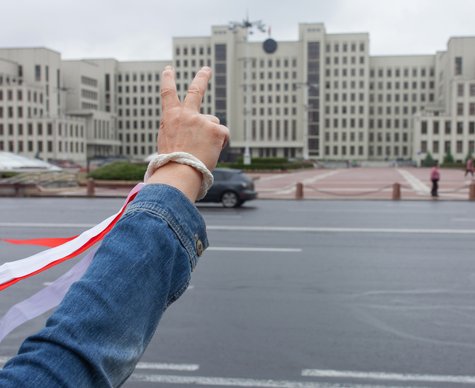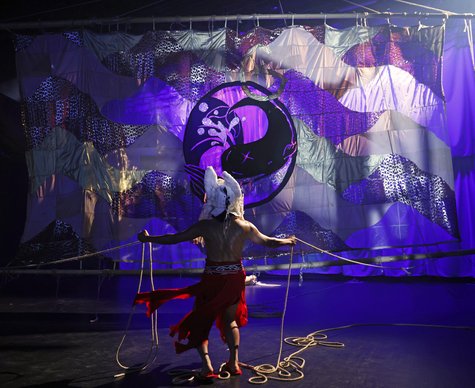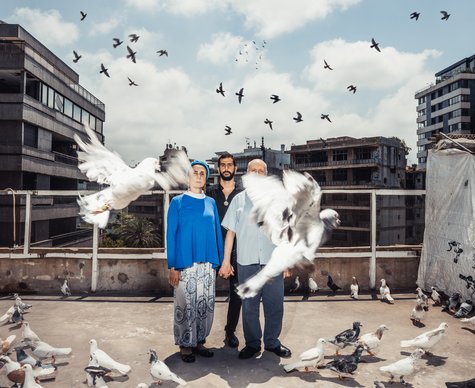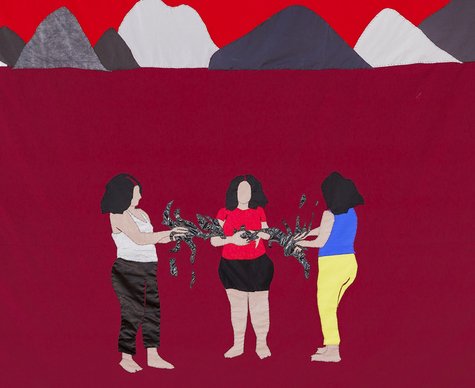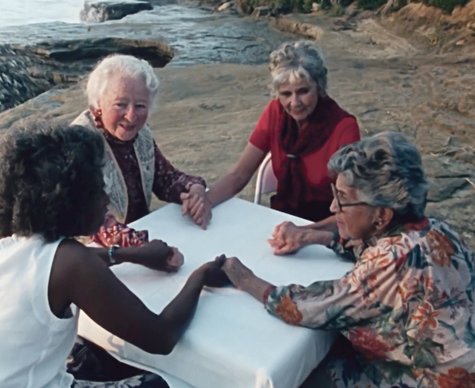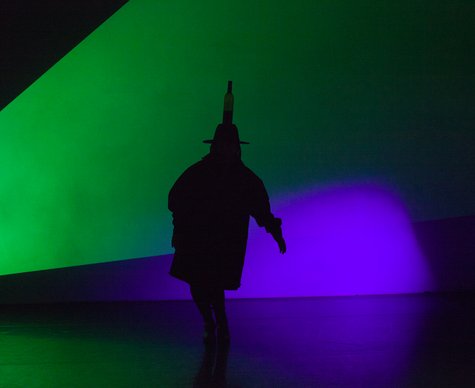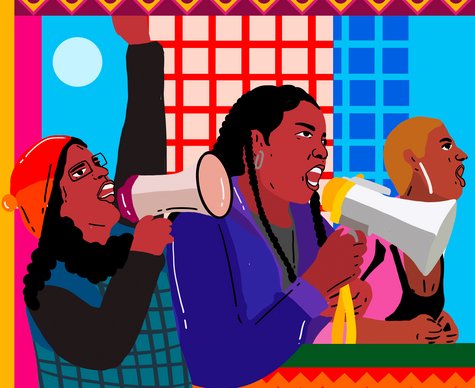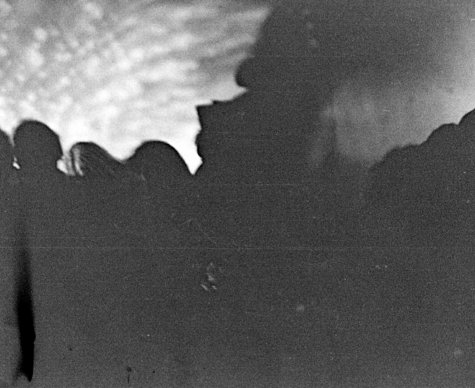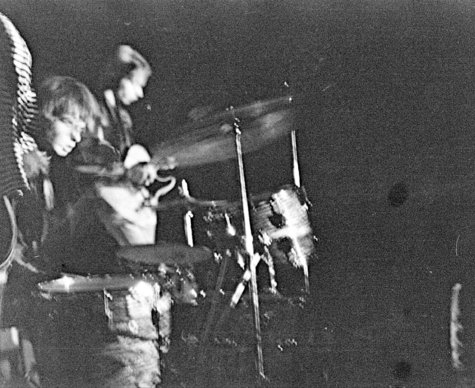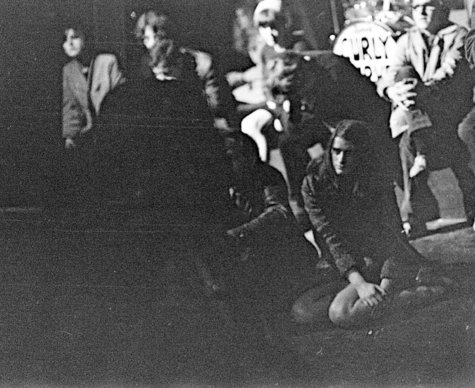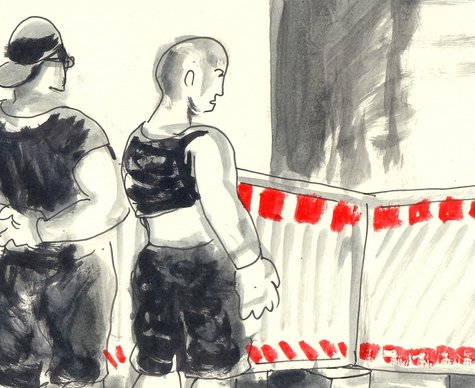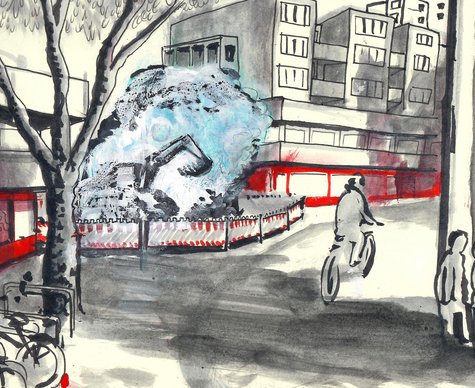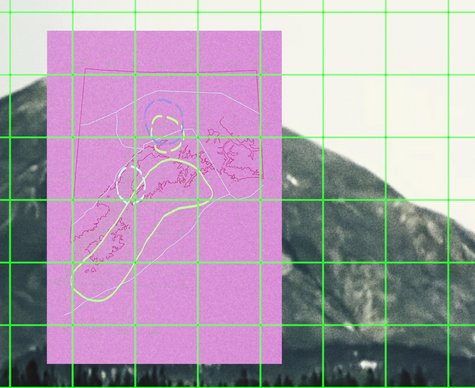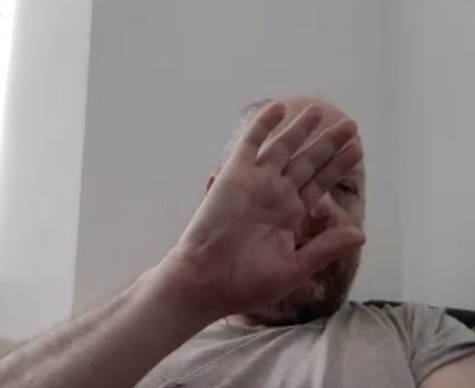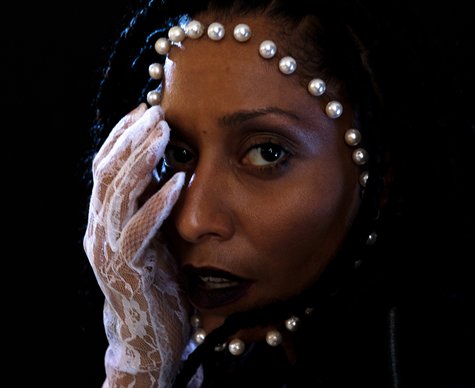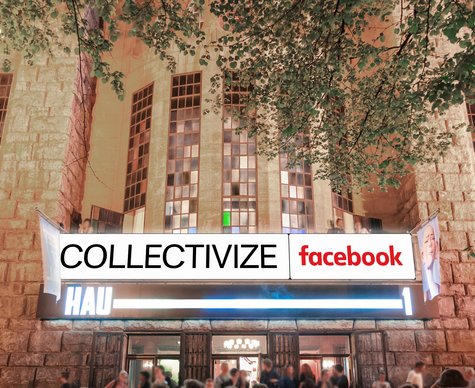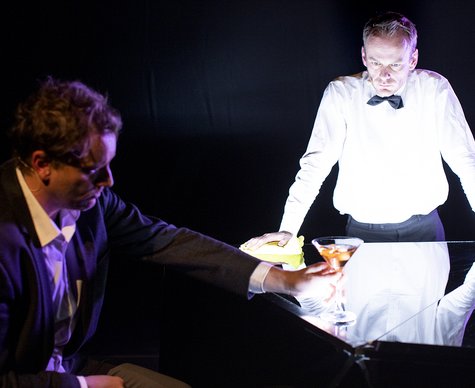Michaelina Jakala, Agri Ismaïl, Adham Hafez
Violence of Inscriptions #4
On the Integrity of the Body (Day 1)
Part of “Violence of Inscriptions. A project by Sandra Noeth and Arkadi Zaides and HAU Hebbel am Ufer”
- Dialogue
- Dance
The idea – and the claim – of the integrity of the body are at the core of the last edition of “Violence of Inscriptions.” What does it actually mean for our bodies to stay safe and sound, without harm, under the experience of structural violence? And what can we set against these often indirect and creeping attacks on our own and other people’s bodies – aesthetically, symbolically, by words? The practice of our international guests from arts, human rights activism and theory is the starting point for the 3-day presentation and workshop programme: over-writing scars with tattoos; filming and dancing of gestures and movements that are about to withdraw or disappear; writing in order to make the silencing and political stigmatization of bodies speakable again; defining shame and neglect as meaningful places to artistically act from.
Lecture by Michaelina Jakala
Deconstructing ethics and the body
Bodily integrity and ethics, to many researchers within the fields of post-war peacebuilding and transitional justice, commonly exist within the realm of physical safety and the avoidance of (re)traumatisation. Yet, the research process itself is often momentary and potentially de-humanising for those who are the ‘researched’. This conversation unpacks, through critical reflection, how these fields intersect with bodily integrity and ethics. Drawing upon on thirteen years of research withmarganialised groups and survivors of mass atrocity in post-war Bosnia-Herzegovina this conversation will explore questions such as how research impacts upon the body and what are the long-term ethical implications of such research. How can we avoid contributing to structural violence through the research process? And how do we begin to (re)humanize the research process by seeing the body as a complete entity?
Dr Michaelina Jakala is a Research Fellow at the Centre for Trust, Peace and Social Relations at Coventry University, UK. Her research explores the everyday experiences of peacebuilding and transitional justice in post-war contexts such as Bosnia and Herzegovina. She is particularly interested in how past systems pervade the everyday within a post-war context. Her research focuses on marginalised groups such as survivors of wartime sexual and gender based violence and critically explores these issues through ethnographic and participatory methods. She is also interested in issues of ethics and research within post-war environments. She currently teaches on the MA in Peace and Conflict Studies and previously worked with young people and peacebuilding within the civil society sector in Bosnia-Herzegovina.
Lecture by Agri Ismaïl
The Body Instrumental: legal restrictions on bodily integrity
If we proceed from the premise that each individual has the right to make their own decisions in relation to their body, and that we possess both bodily autonomy and integrity, what legal justification can there be for the many restrictions we encounter? Why is it, for instance, illegal to tattoo your face in Denmark, or to kill yourself in Cyprus?
And if there are restrictions to bodily autonomy, how narrow can these become before the body can no longer be deemed autonomous at all? What if we instead think of the human body as a free-range animal, free to roam within specific confines, fulfilling a societal purpose, not noticing borders and restrictions until they they are pushed back by them?
The notion of overriding purpose that overrules bodily integrity can be clearly seen in such an anti-abortion stance that deems the woman’s body an enemy of her womb. Also, through such a prism, it makes sense that one’s body returns to being an object (deemed “abandoned” by the self in the 19th century), which can only be treated in one of a few ways for burial rites. Or how only some bodies are granted the right to autonomy at all, whilst the undesired linger in facilities where their bodies can be held in not because they have committed a crime, but because their continued presence in a country is deemed a potential risk, as happens with refugees in many countries who have had their asylum claim rejected. Is the notion of an autonomous body then still a relevant framework to understand the role of the body in human society, or do we need to reframe what we mean when we talk about bodily integrity?
Agri Ismaïl is an author and corporate lawyer, based in Sweden. He has written about choreography in Nutida Musik, Magazine of Moving Bodies, and for the projekt Koreografikritikverkstad.
Lecture Performance by Adham Hafez / HaRaKa Platform
To Catch A Terrorist
"To Catch A Terrorist" is a work that looks at the disciplining of bodies, the formation of borders, and the instrumentalization of fear. Based on American court transcripts documenting the first Arab and Muslim naturalization cases, this production stages these early 20th century documents for the first time, in juxtaposition to newly collected interviews with Arab and Muslim citizens attempting to cross borders, collapsing the historical distance between the past and today. While the impact of violence maybe viscerally visible when we address crises of war, it is in the quotidian micro-aggressions and daily violations of the humanness of a subject that we are reminded of institutionalized violence; a violence that is selective in its scope of enactment. The production looks at howt he “performance” of law creates categories of being, tiers of citizenship, and classes of humanity, and how empirical modes of propagating knowledge could feed into political practices of body control. Through dark humor, data analysis, and inquiries that range from interviews with travelers at borders to traces of exorcist rituals set to deconstructed classical Arabic music, "To Catch A Terrorist" investigates vision planes and visibility in relation to the emergence of non-Western subjects in public discourse.
Performer: Duncan Evannou
Spectral Performers: Lamia Gouda, Mona Gamil, Ghida Nouri, and guests
Choreography and text: Adham Hafez
Data analysis: Adam Kucharski
Research: Sawsan Gad, Lamia Gouda
Costume consultant and designs: Mona Hamid/ Monzlapur New York
Accessories design: Redaa Gharib
Drawings: Manar Abdelmaaboud
Music: Adham Hafez and Nader Hafez
Space consultant: Samir Kordy and Mohamed Hafez
Visual research: Marco Mezzavilla, Mike McCormack, Waad Taai
Light Design: Marie Yokoyama
Originally commissioned for La Mama Moves Festival (NYC), To Catch A Terrorist is a production of Adham Hafez Company, in partnership with La Mama ETC (NY), HaRaKa Platform (Cairo), and with the support of Kuchar&Co (EG/ US)
Afterwards: dialogue between Agri Ismaïl, Michaelina Jakala, Adam Kucharski and Sandra Noeth.
Dates
Credits
A project within the context of the Bündnis internationaler Produktionshäuser, funded by the Beauftragten der Bundesregierung für Kultur und Medien.
![[Translate to EN:]](/fileadmin/Hau/_processed_/a/3/csm_BIP_Logo_11a27aec94.jpg)
![[Translate to EN:]](/fileadmin/Hau/_processed_/3/d/csm_Beauftragte_der_Bundesregierung_fu__r_Kultur_und_Medien_Logo_45d31b5c73.png)
Location
HAU1
Stresemannstr. 29, 10963 BerlinThere are two marked parking spots in front of the building. Access to the Parkett by means of a separate entrance with lift when necessary. Barrier-free restroom facilities are available. Tickets for wheelchair users and accompanying persons can be booked via the ticketing system. If you need any help, please contact our Ticketing & Service team at +49 (0)30 259004-27 or send us an email at
tickets@hebbel-am-ufer.de.



















